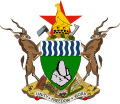This article needs additional citations for verification .(January 2021) |
| Chief Justice of Zimbabwe | |
|---|---|
| Mukuru wevatongi | |
 | |
since 27 March 2017 | |
| Style | Honourable |
| Appointer | President of Zimbabwe |
| Term length | No term limit; must retire at 70, unless allowed to continue to 75 by the President |
| Constituting instrument | Constitution of Zimbabwe |
| Inaugural holder | Sir Murray Bisset (Chief Justice of Southern Rhodesia) Sir John Fieldsend (Chief Justice of Zimbabwe) |
| Formation | 1927 (Southern Rhodesia) 18 April 1980 (Zimbabwe) |
The Chief Justice of Zimbabwe is the chief judge of the Supreme Court of Zimbabwe. As such, he is head of the Zimbabwe judiciary.
Contents
- History of the office
- Duties
- Oath of office
- List
- Chief Justices of Southern Rhodesia
- Chief Justices of Rhodesia
- Chief Justices of Zimbabwe
- See also
- References
Per Section 168 of the Zimbabwean Constitution, the Chief Justice is assisted by a Deputy Chief Justice and no fewer than two other associate justices. The Chief Justice leads the business of the Supreme Court and presides over oral arguments. He is also the most senior of the three members of the Zimbabwe Court of Appeals. The Chief Justice also administers the oath of office to the President of Zimbabwe. Like other Supreme Court justices, he is obligated to retire at age 70, unless, before he attains that age, he elects to continue in office for an additional five years. This extension of office is subject to the approval of the President, following consultation with the Judicial Service Commission and submission of a medical report as to their mental and physical fitness to continue in office. [1]
Since the court was established in 1927, 14 men have served as Chief Justice. This includes eight chief justices during the Southern Rhodesia and Rhodesia periods. The first Chief Justice was Sir Murray Bisset. Since Zimbabwe's independence in 1980, six men have served as Chief Justice. Of these six, three have been White and three Black. The current Chief Justice since 2017 is Luke Malaba.

